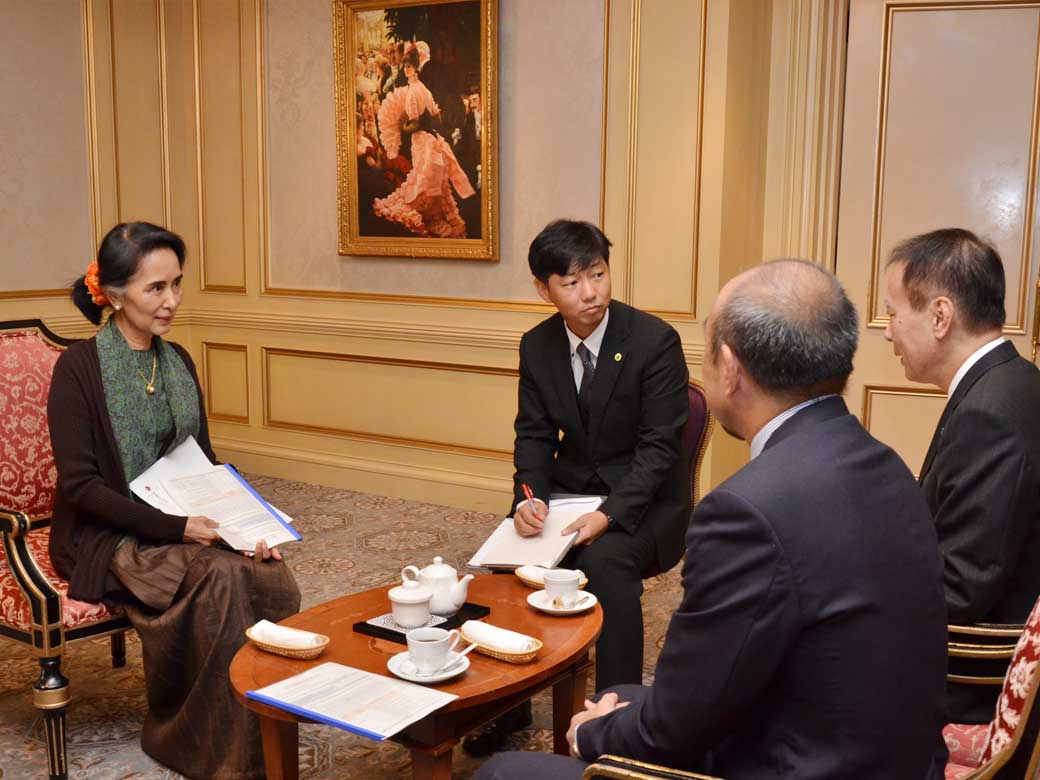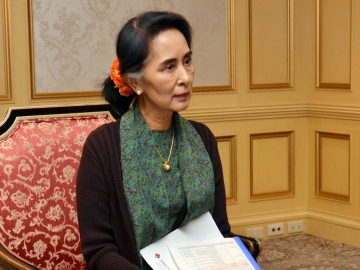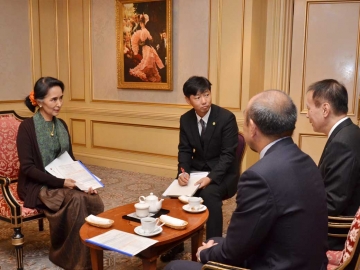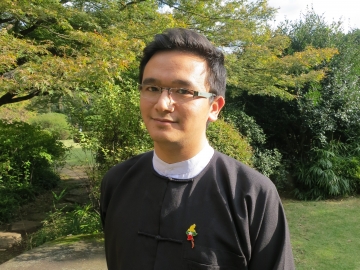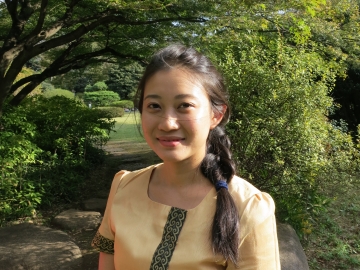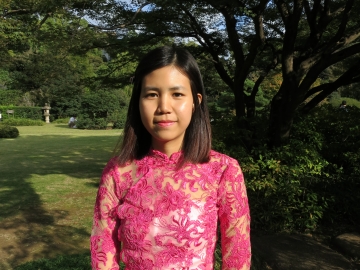President Kamata greets Aung San Suu Kyi
Wed, Nov 2, 2016-
Tags
On November 2, Waseda University President Kaoru Kamata and Norimasa Morita, the vice president for International Affairs, greeted Aung San Suu Kyi, the world-renowned democratic reform leader and 1991 Nobel Peace Prize winner. Now the State Counsellor of Myanmar, she came to the Rihga Royal Hotel Tokyo and spoke in front of Japan’s Myanmar community, including the 16 students from Myanmar currently enrolled at Waseda University. President Kamata and Vice President Morita informed Aung San Suu Kyi about how dedicated the students from Myanmar are to their studies and to use their knowledge for their country.
Myanmar emerged from military rule in 2011 and has been undergoing major political changes ever since. Waseda University has agreements with the University of Yangon and Yangon Technological University. Furthermore, to recruit talented students with potential to become international leaders, Waseda University provides a wide array of support for its students, including the special scholarship established in September 2014 for graduate students from Myanmar. This covers full tuition and fees, such as admission fee and a monthly stipend.
Special Scholarship Program for Students from the Republic of the Union of Myanmar
On this occasion of Aung San Suu Kyi visiting Japan, we interviewed three Waseda students from Myanmar. In Part 1, we will introduce why they chose Waseda University and about their studies.
- Thant Zin Oo, 2nd year student at the Graduate School of Political Science
- Wint Wint Aung Khaing, 1st year student at the Graduate School of Political Science
- Thit Oo Kyaw, 1st year student at the Graduate School of Creative Science and Engineering
“I have a special connection to Japan.” -Thant
Thant Zin Oo was among the first group of students on Waseda’s Myanmar scholarship. He is now in his second year studying constitutional law, political history, and philosophy at the Graduate School of Political Science under Professors Norikazu Kawagishi and Masashi Yazawa. He first came to Japan when he was eleven years old as a Junior Ambassador for the Asia-Pacific Children’s Convention in Fukuoka. APCC is a well-established and recognized program which invites children from 45 countries in the Asia-Pacific region to promote mutual understanding and nurture an international perspective. When he was eighteen, Thant was selected as a Peace Ambassador for the same program, and again in 2012 he took part in the Kizuna Project, where he worked as a volunteer in the Tohoku area for three months on post-disaster rebuilding. In 2013, as President of the Bridge Club, a branch of APCC’s alumni group, he came to Japan for the fourth time to celebrate APCC’s 25th anniversary. Thant said, “I personally feel that I have a special connection to Japan. I love the Japanese people and culture, and I have always thought about studying here. To me, Japan is like a second home.”
On the reasons why chose Waseda University, Thant pointed to the scholarship and the flexibility which allowed him to study what he was truly passionate about. “Many Myanmar people have been out of touch with politics throughout their life. I have always wanted to study politics, but the problem was that this discipline was not offered at universities. Actually, my first degree is in medical science, but after graduating, I contemplated my true passions in politics and social sciences. I happened to visit an education fair to look for graduate programs, and Waseda University was there. The question I asked there was, ‘Can I study politics even if my first degree is different?’ And, they said ‘Yes.’ This never happened before, especially because Japanese universities often have strict restrictions. However, this scholarship program is very special because it has insight to Myanmar’s situation and caters to interested students. This is so amazing.”
The international community
Thant is enjoying the diverse student body and the academic environment at Waseda. “I like the way discussions are carried out in class. We have 90-minute classes of interactive discussions. There are many international students in these classes where we can share our global views. For example, there is a woman from Iraq studying politics, which is quite special, and I have a Singaporean friend who is a Waseda graduate now working as a United Nations officer. And, although there are national conflicts between Myanmar and China, I have friends from there as well. Aside from classes, we have time to read and think on our own, which is intellectually stimulating.”
Another Myanmar student in the Graduate School of Political Science is Wint Wint Aung Khaing. She entered the master’s degree program this April and is conducting comparative studies on democratization to better understand the political transitions happening in her own country. Khaing, who is fluent in Japanese, said the reason for her to study abroad in Japan was simple. “I studied Japanese at university in Myanmar, and my seniors who studied in Japan told me that the idea and style of education were totally different here. In Japan, there are opportunities to learn special subjects, such as political science and social sciences, which do not exist in Myanmar. I wanted to go beyond studying languages. When I was selected for an undergraduate scholarship at a Japanese university in Nagoya which only 1% of the students receive, I was very happy. When I arrived, my life changed because of the international students I met.”
“Choosing Waseda was one of the best decisions I have made in my life.” -Khaing
After this experience, Khaing decided to further pursue a master’s degree, and although she was accepted to the graduate program at the same university, Waseda was her first choice. “Waseda University was the place I wanted to go. There was a case between Myanmar and Bangladesh on Rohingya refugees in my 4th year at university in Japan. At that time, I was studying international relations, specifically focusing on Myanmar and the United Nations. As a student who was studying about the United Nations, I questioned myself, ‘Why isn’t the UN taking action? What can I do for my people?’ So, I decided to continue on to graduate school to research about Myanmar. Then, one of my seniors introduced me to Waseda University’s special scholarship program for Myanmar students. Now that I have been here for 7 months, I can say that it was one of the best decisions I have made in my life because Waseda University gives a lot of opportunities, and the University has a history of academic excellence with so many intelligent alumni.”

The quiet and knowledgeable Japanese students
Khaing said she admires her advisors, Professors Hideko Magara and Keiichi Kubo, and observed some differences between international and Japanese students in their seminars. “The two seminars are totally different. In the seminar with more international students, there are students from Italy, Mongolia, England, and France who study different aspects of democracy. We speak English every day and learn many things from each other. I don’t feel any barriers between myself and them, but I make an effort to speak with Japanese students. The Japanese students are reserved, but on the other hand, they have a lot of knowledge and solid training in methodologies.”
“I wanted to take advantage of the advanced studies in coastal and hydraulics engineering in Japan.” -Kyaw
Thit Oo Kyaw, who just arrived in September, is a master’s student of coastal engineering and management with Professor Tomoya Shibayama in the Graduate School of Creative Science and Engineering. She learned of Waseda University though her father and her teachers. “My father introduced me to Waseda University. He is a government official who stayed in Japan for 3 months for a training program by JICA. He told me that Japanese people are very well-mannered. Also, my teachers, some of whom received their PhDs from Japanese universities, advised me to study in Japan because Japan is very similar to Myanmar in a sense that it is surrounded by water. I wanted to take advantage of the advanced studies in coastal and hydraulics engineering in Japan. Luckily, when I was looking for scholarships provided by Japanese universities, I found the program offered by Waseda. Also, I chose Waseda because Professor Shibayama has deep interest in the coastal engineering situation in Myanmar. He has also encouraged me to do research on my own country.”
Kyaw’s research interests are waves and coastal structures. Currently, she is learning the advanced tools necessary for conducting research and is studying about wave climate in Myanmar’s coastal regions. Because Professor Shibayama’s expertise includes natural disaster, Kyaw is investigating wave conditions that were caused by severe historical cyclones that hit Myanmar by using mathematical simulations. Kyaw says that Professor Shibayama is kind to international students. “He has given me good guidance for conducting research. And recently, I went to Tohoku with him and other students from the laboratory to survey the Tohoku area’s reconstruction. This was an amazing experience for me because I got the chance to study the coastal structures which I had only learned about in books.” Furthermore, Kyaw said she really likes that her professor encourages the Japanese students in the laboratory to give progress report presentations in English. “In this way, I can understand the research topics of other students and explore what they are studying. It is really advantageous that I can improve my knowledge by having discussions with other students.”
Global and progressive, Waseda University provides a rich educational experience for both Japanese and international students, especially those with outstanding talent and who are driven to change the world. Moreover, we are committed to academic excellence and ensuring a stimulating, academic environment.
In Part 2, we will ask Thant, Khaing and Kyaw about living in Japan and their future goals.

This interview has been edited for clarity and length.
Messages from the students
https://www.youtube.com/watch?v=Tuj-Vd6I-kY
https://www.youtube.com/watch?v=3osgq5KC89c
https://www.youtube.com/watch?v=YBCAEl7QzGo


